Martin Edwards's Blog, page 223
June 12, 2013
Heartbeat Country
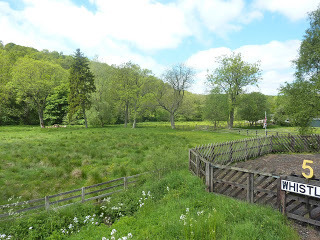

Peter Walker, who (under the name Nicholas Rhea) wrote the books on which the enormously successful TV series Heartbeat was based, is the man who set up the Northern Chapter of the CWA, of which he was the convenor for many years. He's a great guy, and it was really good to have lunch with him and his wife Rhoda at another chapter meeting in Yorkshire on Sunday.
I was able to tell Peter and Rhoda that the previous day I'd finally achieved an ambition by travelling on the North Yorkshire Moors Railway, the preserved steam engine line that runs through "Heartbeat Country" on the moors, passing through the station at Goathland where a good many scenes in the series were filmed. Departing from Pickering, you can reach the other end of the line at Whitby in an hour and a half, and on a fine day, it's a beautiful trip. I'd made the excuse for years of waiting for a fine weekend, and happily Saturday was the ideal day to undertake the journey.
There's somethng about steam railways that provokes nostalgia, and whenever I've travelled on lines like this (an old favourite being the Tal-y-Llyn line in mid-Wales), I'm impressed by the devotion of the volunteers who devote so much time and effort to ensuring that these lines and trains are not lost forever, but are used to introduce people to lovely corners of the countryside. A sign of the success of the NYMR venture was the large party of German tourists who were having a wonderful time on board.
The NYMR is very different from the conscious glamour and luxury of the Orient Express, but in its own way, it is equally appealing (and a lot cheaper, believe me..) I had a great time, and I'd like to do the trip again and spend more time at Goathland. I was struck, too, by the number of guidebooks available with a Heartbeat theme. Peter's stories certainly struck a chord with millions of people. And I find it interesting that the leading scriptwriter on the series was the former cricketer and now novelist Peter Gibbs, whose Settling the Score I enjoyed so much, and whom I had the pleasure of meeting for the first time recently. Both the Peters, Walker and Gibbs, are delightful companions. And highly entertaining writers.

Published on June 12, 2013 04:08
June 11, 2013
Twittering
Ages ago (years!) I set up a Twitter account. Or to be strictly accurate, my son did it for me. I was encouraged to tweet by Maxine Clarke, but at the time, I quickly became overwhelmed with work and domestic issues, and decided to focus on writing novels and blog posts instead. So I abandoned Twitter.
At Crimefest last week-end, a number of conversations prompted me to give Twitter another try. Karen Meek of Eurocrime (who, incidentally, gave her surname to a character in The Frozen Shroud) asked me to write a blog post in memory of Maxine for the Petrona Remembered blog. And this reminded me of the way Maxine used to encourage me to overcome my technofear.
Nev Fountain told me of how he'd written a story in tweets, and this idea of playing a game with the form did appeal to me a lot. He was enthusiastic about Twitter, as were several other people, notably Ann Cleeves, who often gives me, along with other writers, generous and helpful advice based on her own successful experience.
Of course there are lots of reasons not to spend too much time with Twitter. I'm still rather busy as a partner in a law firm, though becoming part of a firm as large as Weightmans has helped to ease the burdens that existed in the past. I've got to find time to write books, short stories and blog posts. And have a life outside writing. But I've decided that I won't continue to use these as excuses for not tweeting. Instead they will become excuses for getting confused about Twitter etiquette, and general incompetence. Given that my initial attempts to include the cover of The Frozen Shroud on my Twitter home page have been greeted with the message that "something is technically wrong" (any clues as to what I'm doing wrong would be welcome), it may be a bumpy ride...
Of course, as anyone who knows lawyers is aware, we tend to be verbose. So 140 characters is sure to prove a challenge. All the same, I look forward to trying to rise to it..
At Crimefest last week-end, a number of conversations prompted me to give Twitter another try. Karen Meek of Eurocrime (who, incidentally, gave her surname to a character in The Frozen Shroud) asked me to write a blog post in memory of Maxine for the Petrona Remembered blog. And this reminded me of the way Maxine used to encourage me to overcome my technofear.
Nev Fountain told me of how he'd written a story in tweets, and this idea of playing a game with the form did appeal to me a lot. He was enthusiastic about Twitter, as were several other people, notably Ann Cleeves, who often gives me, along with other writers, generous and helpful advice based on her own successful experience.
Of course there are lots of reasons not to spend too much time with Twitter. I'm still rather busy as a partner in a law firm, though becoming part of a firm as large as Weightmans has helped to ease the burdens that existed in the past. I've got to find time to write books, short stories and blog posts. And have a life outside writing. But I've decided that I won't continue to use these as excuses for not tweeting. Instead they will become excuses for getting confused about Twitter etiquette, and general incompetence. Given that my initial attempts to include the cover of The Frozen Shroud on my Twitter home page have been greeted with the message that "something is technically wrong" (any clues as to what I'm doing wrong would be welcome), it may be a bumpy ride...
Of course, as anyone who knows lawyers is aware, we tend to be verbose. So 140 characters is sure to prove a challenge. All the same, I look forward to trying to rise to it..
Published on June 11, 2013 03:12
June 9, 2013
Agatha Christie's Poirot: Elephants Can Remember - ITV review
Agatha Christie's Poirot began its final series tonight with Elephants Can Remember, featuring David Suchet as Poirot and Zoe Wanamaker as Mrs Ariadne Oliver. The book, it has to be said, is one of Christie's worst, a rambling effort written at the end of her career when her powers were failing and her publishers were too much in awe of her to edit what she wrote with the necessary ruthlessness. I read it not long after its first publication in the early 70s, and was so disappointed that it's one of the few Christies I've never bothered to reread..
Oddly enough, the flaws of the original presented more of an opportunity than a grim challenge for the screenplay writer, Nick Dear, a BAFTA winner whose CV includes a version of Jane Austen's Persuasion. I can think of a number of Christie books that have been ruined by over-the-top adaptatons in the past few years, but Dear did a good job with this "cold case" mystery, inventing liberally to compensate for a lack of dramatic material in the book.
As with a number of other televised Christies, the action was shifted to the between the wars period that seems well suited to puzzle stories of this kind, even when they were written much later. Wanamaker was, as usual, great fun in her zestful efforts to establish the truth about the apparent murder and suicide of the parents of Celia Ravenscroft (well played by Vanessa Kirby, who was equally good in Kate Mosse's Labyrinth). It was a shock to see the super-glamorous Greta Scacchi playing the part of an ageing battleaxe, but like the rest of the cast, she was excellent.
People who don't like Agatha Christie point to flaws in characterisation and wildly unlikely plot devices, and Elephants Can Remember is a book which suffers from these weaknesses. But this lavishly produced TV version showed that sympathetic adaptation can work wonders with unsatisfactory source material. The result was decent Sunday evening entertainment, and certainly the screenplay is better than the book. But it's only fair to add that Christie cannot sensibly be judged by her last few novels. Her reputation is built on those ingenious classic mysteries she wrote long before her powers declined, and could hardly be more secure.
Oddly enough, the flaws of the original presented more of an opportunity than a grim challenge for the screenplay writer, Nick Dear, a BAFTA winner whose CV includes a version of Jane Austen's Persuasion. I can think of a number of Christie books that have been ruined by over-the-top adaptatons in the past few years, but Dear did a good job with this "cold case" mystery, inventing liberally to compensate for a lack of dramatic material in the book.
As with a number of other televised Christies, the action was shifted to the between the wars period that seems well suited to puzzle stories of this kind, even when they were written much later. Wanamaker was, as usual, great fun in her zestful efforts to establish the truth about the apparent murder and suicide of the parents of Celia Ravenscroft (well played by Vanessa Kirby, who was equally good in Kate Mosse's Labyrinth). It was a shock to see the super-glamorous Greta Scacchi playing the part of an ageing battleaxe, but like the rest of the cast, she was excellent.
People who don't like Agatha Christie point to flaws in characterisation and wildly unlikely plot devices, and Elephants Can Remember is a book which suffers from these weaknesses. But this lavishly produced TV version showed that sympathetic adaptation can work wonders with unsatisfactory source material. The result was decent Sunday evening entertainment, and certainly the screenplay is better than the book. But it's only fair to add that Christie cannot sensibly be judged by her last few novels. Her reputation is built on those ingenious classic mysteries she wrote long before her powers declined, and could hardly be more secure.
Published on June 09, 2013 14:44
June 7, 2013
Forgotten Book - Puzzle for Fiends
Patrick Quentin was one of the Forgotten Authors featured at Crimefest last week, and Quentin, alias Q. Patrick, alias Jonathan Stagge, is one of the most interesting of all pseudonymous American crime writers, not least because, in total, those names concealed not just one identity, but four. The most notable were Richard Webb and Hugh Wheeler. They started a series under the Quentin name featuring Peter Duluth, and my Forgotten Book for today, Puzzle for Fiends, a Duluth story.
The premise is super. After a brief prologue in which Peter waves off his new wife Iris at an airfield, the picture transforms when he wakes up after an accident, suffering from amnesia. He is surrounded by people who claim to be family members or associates and who say that he is the wealthy Gordon Renton Friend the Third. Whilst it's some consolation that his newly found wife, mother and sister are all very beautiful, he finds himself trapped in a nightmarish situation, from which escape seems impossible.
Of course, variations on this theme have often been used in mysteries - the Liam Neeson film Unknown is an excellent recent example. But Quentin handles it well, and it's no surprise that this book has been highly regarded, not least by Julian Symons. There are plenty of plot twists along the way - you can always rely on the PQ (or QP) franchise for tantalising mysteries.
And yet. I felt there were some unsatisfactory features of the second half of the story which meant that I wouldn't regard it as a classic, much as it entertained me. There is a puritanical cult called the Aurora League which features heavily in the plot, and although it is satirically and wittily described, I felt that its sheer absurdity militated against suspense. As Cornell Woolrich showed in nightmare-scenario books like Phantom Lady, the way to handle a story like this is to maintain tension throughout, and Puzzle for Fiends didn't quite manage this. All the same, it remains a lively and efficient thriller, still worth reading.
The premise is super. After a brief prologue in which Peter waves off his new wife Iris at an airfield, the picture transforms when he wakes up after an accident, suffering from amnesia. He is surrounded by people who claim to be family members or associates and who say that he is the wealthy Gordon Renton Friend the Third. Whilst it's some consolation that his newly found wife, mother and sister are all very beautiful, he finds himself trapped in a nightmarish situation, from which escape seems impossible.
Of course, variations on this theme have often been used in mysteries - the Liam Neeson film Unknown is an excellent recent example. But Quentin handles it well, and it's no surprise that this book has been highly regarded, not least by Julian Symons. There are plenty of plot twists along the way - you can always rely on the PQ (or QP) franchise for tantalising mysteries.
And yet. I felt there were some unsatisfactory features of the second half of the story which meant that I wouldn't regard it as a classic, much as it entertained me. There is a puritanical cult called the Aurora League which features heavily in the plot, and although it is satirically and wittily described, I felt that its sheer absurdity militated against suspense. As Cornell Woolrich showed in nightmare-scenario books like Phantom Lady, the way to handle a story like this is to maintain tension throughout, and Puzzle for Fiends didn't quite manage this. All the same, it remains a lively and efficient thriller, still worth reading.
Published on June 07, 2013 11:56
June 5, 2013
Crimefest 2013 - part three
One of the highlights of my Saturday at Crimefest was the chance to appear on a panel moderated, with his customary wit, by Len Tyler. We were talking about detective duos, and fellow panellists were Helen Smith, whom I'd never had the pleasure of meeting before, Dorothy Cannell, who had been a member of our pub quiz team, and fellow Northern lawyer Neil White. Neil and I have a favourite shared trivia question: which character in his books used to work for me? The answer is Laura McGarritty/ The real life Laura's husband Duncan is a great friend of Neil's and was for many years a work colleague of mine, as was Laura. Neil used Laura's name for the female lead character in his first series of books.
Dorothy came up with an intriguing idea during the panel - she said she regarded characters in her books as employees who had to interview well to be included, and were subject to being dismissed every now and then if they didn't perform. There has to be an article worth writing to examine that metaphor. The panel was very enjoyable, and also rather relaxing, since I must say I find it easier being a panel member rather than a moderator.
Nev Fountain hosted an excellent session on Sherlock with Mark Gatiss, Steven Moffat, and Sue Vertue, and I enjoyed Nev's company when I found myself sitting with him and his partner Nicola, a very successful actor and also a songwriter, at the gala dinner. Among the award winners were the admirable Ruth Dudley Edwards and Barry Forshaw. Barry won the H.R.F. Keating award for best crime reference book of the past five years,which was presented by Sheila Mitchell, Harry's widow.
I had a hand in setting up the award, though since I'd contributed essays to two of the books on a fabulous shortlist which also included fine books by P.D. James, John Curran and others, I decided it wasn't right for me to vote. Anyway, it was so hard to choose. But Barry's encyclopaedia on British Crime Writing was a worthy winner, I must say. The quality of the shortlist shows how strong writing about the genre has become in the UK in recent years, a development which is enormously pleasing.
Sunday saw an enjoyable interview with Robert Goddard, and then the annual Mastermind quiz, which was won by Peter Guttridge. One of the questions for Peter was about the legal subject in which I specialise. His answer was corporate law, and although this is not now the case, he was closer than he realised. I did start out my legal career combining employment law with corporate work. In fact my first published book was Understanding Computer Contracts. There has to be another quiz question there...
All in all, a marvellous four days. Adrian Muller and his fellow organisers did a great job as usual, and I feel that Crimefest is getting better each year. As ever it was good to see old friends, and meet a host of delightful people for the first time, including Helen, Dorothy. Nev, Nicola, Jeff Siger, James Wills, Alexandra Benedict, Xavier-Marie Bonnot, Quentin Bates, as well as a good many others. I've already booked for next year.
Dorothy came up with an intriguing idea during the panel - she said she regarded characters in her books as employees who had to interview well to be included, and were subject to being dismissed every now and then if they didn't perform. There has to be an article worth writing to examine that metaphor. The panel was very enjoyable, and also rather relaxing, since I must say I find it easier being a panel member rather than a moderator.
Nev Fountain hosted an excellent session on Sherlock with Mark Gatiss, Steven Moffat, and Sue Vertue, and I enjoyed Nev's company when I found myself sitting with him and his partner Nicola, a very successful actor and also a songwriter, at the gala dinner. Among the award winners were the admirable Ruth Dudley Edwards and Barry Forshaw. Barry won the H.R.F. Keating award for best crime reference book of the past five years,which was presented by Sheila Mitchell, Harry's widow.
I had a hand in setting up the award, though since I'd contributed essays to two of the books on a fabulous shortlist which also included fine books by P.D. James, John Curran and others, I decided it wasn't right for me to vote. Anyway, it was so hard to choose. But Barry's encyclopaedia on British Crime Writing was a worthy winner, I must say. The quality of the shortlist shows how strong writing about the genre has become in the UK in recent years, a development which is enormously pleasing.
Sunday saw an enjoyable interview with Robert Goddard, and then the annual Mastermind quiz, which was won by Peter Guttridge. One of the questions for Peter was about the legal subject in which I specialise. His answer was corporate law, and although this is not now the case, he was closer than he realised. I did start out my legal career combining employment law with corporate work. In fact my first published book was Understanding Computer Contracts. There has to be another quiz question there...
All in all, a marvellous four days. Adrian Muller and his fellow organisers did a great job as usual, and I feel that Crimefest is getting better each year. As ever it was good to see old friends, and meet a host of delightful people for the first time, including Helen, Dorothy. Nev, Nicola, Jeff Siger, James Wills, Alexandra Benedict, Xavier-Marie Bonnot, Quentin Bates, as well as a good many others. I've already booked for next year.
Published on June 05, 2013 03:44
June 4, 2013
Crimefest 2013 - part two
Among the pleasures of the second day of Crimefest 2013 were the chance to moderate a panel dealing with international mysteries. The panel members were Jeffrey Siger, Quentin Bates, Xavier-Marie Bonnot and Stan Trollip. I'd never met Jeff, Quentin or Xavier-Marie before, and it was a great opportunity to put faces to names and learn more about their books. Stan was a last minute addition to the team, replacing Peter James, who had been involved in a car crash (thankfully, Peter assures me he's still in one piece.) Despite the lack of notice, Stan made a terrific contribution to an enjoyable discussion.
I also attended a talk given by Susan Moody on Oxford Detectives. Susan is a long time member of an international group of crime writers who are coming to Oxford this August. As they have invited me to conduct a literary walking tour, I thought I'd better get some research in early, and Susan's enthusiasm for Edmund Crispin and Michael Innes in particular reminded me I ought to read more of their books. I've never been a great Innes fan, I must confess .I suspect I just read the wrong books long ago - a few of the later ones, which maybe don't fully represent his talent.
Other highlights included a chat with Lindsey Davis, and a meal with James Wills, whom I'd never met before. My literary agent, Mandy Little has represented me from the start of my career, but has recently announced that she will be retiring as an agent before long, while remaining with the business as a consultant. James is her successor and is now managing director of the business, so we were keen to meet each other at long last. And a very good companion he proved to be.
I also attended a panel moderated by Nev Fountain, which dealt with writing for other media. I'm not especially interested in (for example) graphic novels, but I do find the idea of writing for radio quite appealing In fact it's something I did at university, before moving back to the idea of writing novels. Various interesting points were made by a good panel which included Alison Joseph, the recently installed chair of the CWA. And it was especially interesting to me that I met Nev for the first time at the Crimefest gala dinner the following evening. More of that tomorrow.
I also attended a talk given by Susan Moody on Oxford Detectives. Susan is a long time member of an international group of crime writers who are coming to Oxford this August. As they have invited me to conduct a literary walking tour, I thought I'd better get some research in early, and Susan's enthusiasm for Edmund Crispin and Michael Innes in particular reminded me I ought to read more of their books. I've never been a great Innes fan, I must confess .I suspect I just read the wrong books long ago - a few of the later ones, which maybe don't fully represent his talent.
Other highlights included a chat with Lindsey Davis, and a meal with James Wills, whom I'd never met before. My literary agent, Mandy Little has represented me from the start of my career, but has recently announced that she will be retiring as an agent before long, while remaining with the business as a consultant. James is her successor and is now managing director of the business, so we were keen to meet each other at long last. And a very good companion he proved to be.
I also attended a panel moderated by Nev Fountain, which dealt with writing for other media. I'm not especially interested in (for example) graphic novels, but I do find the idea of writing for radio quite appealing In fact it's something I did at university, before moving back to the idea of writing novels. Various interesting points were made by a good panel which included Alison Joseph, the recently installed chair of the CWA. And it was especially interesting to me that I met Nev for the first time at the Crimefest gala dinner the following evening. More of that tomorrow.
Published on June 04, 2013 04:00
June 3, 2013
Crimefest 2013 - part one
I've just returned from Crimefest 2013 in Bristol, a terrific event as usual. In fact, I feel that Crimefest is getting better each year. I know a number of people who told me they wanted to attend but were too late to book a place, and this is a sign of the convention's increasing popularity. It really does strike a nice balance between providing opportunities to socialise and providing panels, interviews and other events of genuine interest. There was a lot going on, and not for the first time I found myself, on leaving, amazed that I'd been so busy yet had still not managed to have a chat with a number of friends and fellow attendees. Next time!
I was lucky enough to be involved with three separate panels, two of them as participating moderator, and the first of these was Forgotten Authors, an event which is now a regular feature of the first afternoon of Crimefest. My fellow panellists were all very knowledgable and enthusiastic about books of the past. Moderating a group comprising John Curran (who chose two of my favourites, Dorothy Bowers and Patrick Quentin, to talk about) , Ruth Dudley Edwards (who chose two more, Cyril Hare and Edmund Crispin), Zoe Sharp and Adrian Magson was the easiest job in the world. The only snag with Forgotten Authors is that there is so much to talk about, we really need several hours. But the room was packed out, and people left with many suggestions about old books to seek out. There's always a feelgood factor about this panel, a sign of the rise in appreciation of books that vanished from the shelves years ago which remain worth reading to this day. I'm pleased to say the organisers have asked me to moderate the same panel again next year.
After a short break it was time for the annual pub quiz. I joined a team which included John, Zoe, Kate Ellis and my former editor at Hodder, Kate Lyall Grant. But it's also good to meet people for the first time, and these included the highly successful American author, Dorothy Cannell, with whom I was also due to be on another panel (at which she came up with an idea which fascinated me, and which I'll talk about in another Crimefest post.) We lost that knowledgeable crime fan Mike Linane to Ali Karim's team on the next table, but also joining us was Alexandra Benedict. There are two novelists called Alexandra Benedict, and so our colleague is published as A.K. Benedict. It turned out she is not only a Cambridge graduate who has written a highly successful debut, but also a composer of music for film and television, a singer and an expert on the ghost story. One website bio says she "writes words and music in a red-walled room filled with mannequins, teapots and the severed head of a ventriloquist's dummy." So really she ought to be a character in a book as well.
Anyway, it was an extremely convivial group and we called ourselves the Forgetful Authors. (In a surreal twist, this anticipated my forgetting the following day to post a Friday Forgotten Book for the first time in ages - you did notice, didn't you?) The quiz was closely contested and we finished up tying with Ali's team. The first tiebreaker question didn't separate the teams, but the next one enabled us to win the day, and collect some very nice prizes, including box sets of Sherlock, about which more soon.) Great fun, and I'll continue the Crimefest Chronicles tomorrow. If I don't forget, that is....
I was lucky enough to be involved with three separate panels, two of them as participating moderator, and the first of these was Forgotten Authors, an event which is now a regular feature of the first afternoon of Crimefest. My fellow panellists were all very knowledgable and enthusiastic about books of the past. Moderating a group comprising John Curran (who chose two of my favourites, Dorothy Bowers and Patrick Quentin, to talk about) , Ruth Dudley Edwards (who chose two more, Cyril Hare and Edmund Crispin), Zoe Sharp and Adrian Magson was the easiest job in the world. The only snag with Forgotten Authors is that there is so much to talk about, we really need several hours. But the room was packed out, and people left with many suggestions about old books to seek out. There's always a feelgood factor about this panel, a sign of the rise in appreciation of books that vanished from the shelves years ago which remain worth reading to this day. I'm pleased to say the organisers have asked me to moderate the same panel again next year.
After a short break it was time for the annual pub quiz. I joined a team which included John, Zoe, Kate Ellis and my former editor at Hodder, Kate Lyall Grant. But it's also good to meet people for the first time, and these included the highly successful American author, Dorothy Cannell, with whom I was also due to be on another panel (at which she came up with an idea which fascinated me, and which I'll talk about in another Crimefest post.) We lost that knowledgeable crime fan Mike Linane to Ali Karim's team on the next table, but also joining us was Alexandra Benedict. There are two novelists called Alexandra Benedict, and so our colleague is published as A.K. Benedict. It turned out she is not only a Cambridge graduate who has written a highly successful debut, but also a composer of music for film and television, a singer and an expert on the ghost story. One website bio says she "writes words and music in a red-walled room filled with mannequins, teapots and the severed head of a ventriloquist's dummy." So really she ought to be a character in a book as well.
Anyway, it was an extremely convivial group and we called ourselves the Forgetful Authors. (In a surreal twist, this anticipated my forgetting the following day to post a Friday Forgotten Book for the first time in ages - you did notice, didn't you?) The quiz was closely contested and we finished up tying with Ali's team. The first tiebreaker question didn't separate the teams, but the next one enabled us to win the day, and collect some very nice prizes, including box sets of Sherlock, about which more soon.) Great fun, and I'll continue the Crimefest Chronicles tomorrow. If I don't forget, that is....
Published on June 03, 2013 07:52
May 28, 2013
Go Back For Murder: theatre review
Go Back For Murder, written by Agatha Christie, last night began a run at the Regent Theatre in Stoke-on-Trent, in a performance by the Agatha Christie Theatre Company, which each year for the past decade has taken a Christie play around the country. I was lucky enough to be offered tickets (long story!) and so, after the fun of watching The Mousetrap in London recently, I jumped at the chance to see this much less renowned play.
And I was very glad I did. The play is based on one of Christie's finest novels, Five Little Pigs. Robert Barnard, no mean judge of Christie, reckons that it is arguaby her best book,and certainly the characterisation is a bit deeper than Christie usually offers.The plot is intriguing, but what I admire most about the story is a very chilling image associated with the commission of the crime. To say more would be a spoiler, but I was pleased to see that the play retained that image, and deployed it very effectively.
A major difference between book and play is that the former features Hercule Poirot, whereas on the stage the detective work is done by a team comprising Carla, daughter of the late Caroline Crayle, convicted years ago of murdering her husband, and her solicitor. This device works very well, in my opinion. The story is somewhat static, and this is evident in the first act of the play, as the detail about the Crayle case is conveyed to the audience, but the second act contains much more movement.
The cast is exceptional. Liza Goddard, Sophie Ward and Lysette Anthony are dazzling actresses. Lysette Anthony was once dubbed "the face of the Eighties" by David Bailey, and at the age of 50 she is truly beautiful. Among the male actors, I was delighted to see Gary Mavers, whom I got to know about ten years ago. Gary comes from Liverpool, and there was a plan for him to play Harry Devlin in a TV series that never got made (there were several such series, sad to say!) I still have somewhere the photos of Gary, as Harry, looking moody on the Liverpool waterfront. He once invited me to see him act in a murder mystery play in Manchester, and it was great to see him here in a very different role, as the murder victim Amyas Crayle. All in all, a very good evening's entertainment.
And I was very glad I did. The play is based on one of Christie's finest novels, Five Little Pigs. Robert Barnard, no mean judge of Christie, reckons that it is arguaby her best book,and certainly the characterisation is a bit deeper than Christie usually offers.The plot is intriguing, but what I admire most about the story is a very chilling image associated with the commission of the crime. To say more would be a spoiler, but I was pleased to see that the play retained that image, and deployed it very effectively.
A major difference between book and play is that the former features Hercule Poirot, whereas on the stage the detective work is done by a team comprising Carla, daughter of the late Caroline Crayle, convicted years ago of murdering her husband, and her solicitor. This device works very well, in my opinion. The story is somewhat static, and this is evident in the first act of the play, as the detail about the Crayle case is conveyed to the audience, but the second act contains much more movement.
The cast is exceptional. Liza Goddard, Sophie Ward and Lysette Anthony are dazzling actresses. Lysette Anthony was once dubbed "the face of the Eighties" by David Bailey, and at the age of 50 she is truly beautiful. Among the male actors, I was delighted to see Gary Mavers, whom I got to know about ten years ago. Gary comes from Liverpool, and there was a plan for him to play Harry Devlin in a TV series that never got made (there were several such series, sad to say!) I still have somewhere the photos of Gary, as Harry, looking moody on the Liverpool waterfront. He once invited me to see him act in a murder mystery play in Manchester, and it was great to see him here in a very different role, as the murder victim Amyas Crayle. All in all, a very good evening's entertainment.
Published on May 28, 2013 16:30
May 27, 2013
Carcassonne
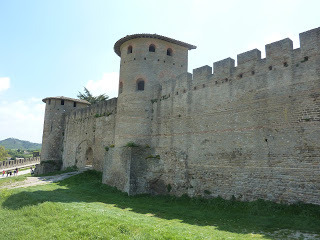
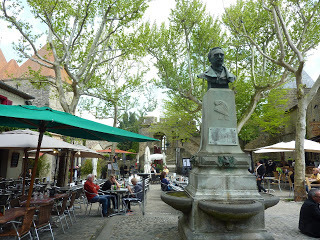

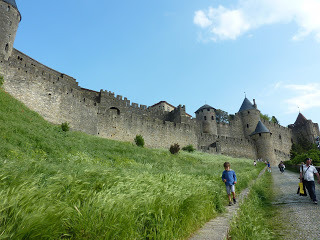
I've had the idea of visiting Carcassonne for a while, but it was given fresh impetus when I watched Kate Mosse's Labyrinth. The beauty of the setting, and its bloody history, took my breath away. One interesting statistic is that my
However, when I finally made it to this fascinating part of southern France, I decided to stay in the heart of the medieval city, at the Hotel de la Cite, which is right next to the Basilica. For a short stay, this proved a wonderful choice. There's nothing like exploring somewhere gorgeous when you are right on the spot, and don't need to travel. Carcassonne more than lived up to expectations.
I didn't see many copies of Kate Mosse's book around, to my surprise, but the history of the Cathars and the Crusades is everywhere. Until recently, I didn't know much about this bit of the past, but it's certainly fascinating, and a son et lumiere show in the grounds of the old castle one evening was a wonderful way to soak up the atmosphere.
The town of Carcassonne outside the old (but restored) walls is also very appealing, and the Canal du Midi runs right past the railway station. Canal trips, as I've mentioned before on this blog, are a favourite pastime of mine, and I managed to fit in three trips up and down the very scenic route. It was all wonderfully relaxing, and put me in just the right frame of mind to start planning my next book.
On the subject of my writing, The Frozen Shroud is due out in the UK next month, and to celebrate, my current plan is to post more regularly to this blog than the usual three times a week. You never know, I may even get around to reviving my Twitter account!
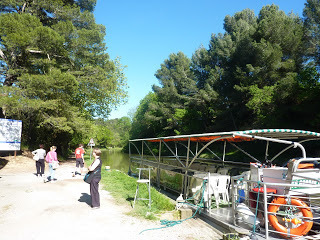


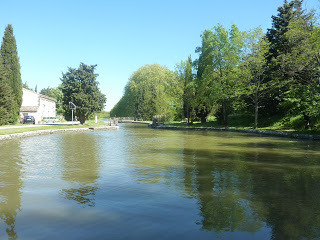
Published on May 27, 2013 07:03
May 24, 2013
Forgotten Book - Murder Isn't Easy
Is it a typo? you may wonder. Is he thinking of Murder is Easy, the far from forgotten title by Agatha Christie? Well, the answer to both questions is no. My Forgotten Book today is a very interesting but neglected gem, written by Richard Hull. Murder Isn't Easy was first published in 1936, a couple of years before Christie's book appeared. He really was ahead of his time!
The book has two distinctive strengths. First, it's wittily written, and the humour has by no means dated badly. I found the story entertaining from start to finish, making some allowances for the passage of time. Second, it is a book with an unusual and very clever structure. Hull's debut, Murder of My Aunt, had a sort of unreliable narrator. Here, we have a great deal of unreliable narration, with the story told from four different viewpoints.
The setting is an advertising business - shades of Sayers' Murder Must Advertise. Hull's account of the business suggests some personal knowledge, though he was an accountant. Perhaps he'd audited such a firm. This one has three equal shareholders, all of whom are rather unattractive men. Latimer, who relates the first section of the story, is in some ways reminiscent of Edward, main protagonist of Murder of My Aunt. The unlovely trio also employ an artist and a secretary, and one remarkable social insight is the easy way that employers used to debate the merits of sacking a woman once she got married. You don't have to be an employment lawyer like me to find this extraordinary.
I don't want to say too much about the story-line, because after a slowish start, it develops in a very effective way. I'm not sure I've read a book quite like this one. And it offers a good example of Hull's particular and enviable gift, to conjure up highly original situations. Sometimes he struggled to execute them in a way that held reader interest to the end, but this little-known story is definitely one of his best.
The book has two distinctive strengths. First, it's wittily written, and the humour has by no means dated badly. I found the story entertaining from start to finish, making some allowances for the passage of time. Second, it is a book with an unusual and very clever structure. Hull's debut, Murder of My Aunt, had a sort of unreliable narrator. Here, we have a great deal of unreliable narration, with the story told from four different viewpoints.
The setting is an advertising business - shades of Sayers' Murder Must Advertise. Hull's account of the business suggests some personal knowledge, though he was an accountant. Perhaps he'd audited such a firm. This one has three equal shareholders, all of whom are rather unattractive men. Latimer, who relates the first section of the story, is in some ways reminiscent of Edward, main protagonist of Murder of My Aunt. The unlovely trio also employ an artist and a secretary, and one remarkable social insight is the easy way that employers used to debate the merits of sacking a woman once she got married. You don't have to be an employment lawyer like me to find this extraordinary.
I don't want to say too much about the story-line, because after a slowish start, it develops in a very effective way. I'm not sure I've read a book quite like this one. And it offers a good example of Hull's particular and enviable gift, to conjure up highly original situations. Sometimes he struggled to execute them in a way that held reader interest to the end, but this little-known story is definitely one of his best.
Published on May 24, 2013 05:16



